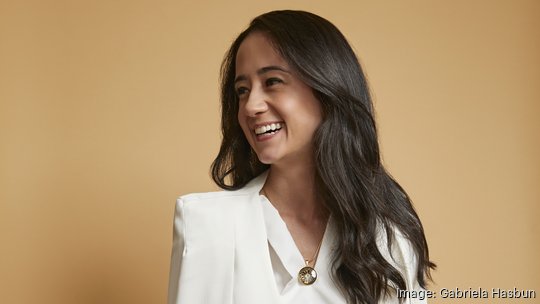
Securing investors for a startup centered on astrology is a “challenge,” admits Chapel Hill entrepreneur Daniela Vianna. But that’s what Vianna is doing as she works to launch an astrology app – powered by artificial intelligence –from the ground up with her startup, Ephemeris.
The company's origin story may be as strange as the concept itself is to non-believers – shaped by a pandemic, closed borders and a leap-of-faith road trip across the U.S.
The company, founded in San Diego and recently relocated to Chapel Hill, started as a consumer product firm selling birth chart talismans and posters. But it’s evolved, using the money it made from selling the jewelry to craft a freemium AI-fueled app that endeavors to give its users an on-call astrologist.
“We feed the AI with the users’ details in a way that no other app is doing,” she said. “You can basically have a conversation with this astrologer on demand, and the astrologer knows your chart, so it will answer your questions.”
Vianna admits there’s skepticism about what she’s trying to do – and it’s forced a lean operation up to this point.
“We needed to become profitable really quickly because investors don’t invest in spiritual products,” she said. “It’s not something that is standard … which means we had to make it work by bootstrapping it.”
Vianna said the firm has pushed past the skepticism, having recently passed the $1.5 million mark in total revenue since inception. It’s the kind of traction she hopes will attract real outside capital – from investors attracted to the business model if not the spirituality of the product.
“We are looking into fundraising now,” she said.
The origin story
For those who know Vianna – she's a Gemini, by the way – Ephemeris is not a surprise. She describes herself as “always very woo-woo,” into yoga and spirituality.
“It’s trying to find purpose and using my time on this planet to do something meaningful,” she said.
She said the dual personality stereotypical of a Gemini comes into play with her interest in technology.
Vianna is a native of Brazil. She left her home country in 2016 for Australia, where, at a marketing firm, she started spit balling about a startup with a colleague.
Vianna said Ephemeris – the culmination of those conversations – was always meant to be an “American company.”
The firm launched in 2019 at a Forbes conference in California. Just a few months later, she trekked to California again, this time for what was supposed to be a four-day meditation retreat in March 2020.
Then Covid hit two days in. The retreat was canceled. Borders closed. And she was stuck.
“Instead of making an effort to go back to Australia, I decided to stay,” she said. “The audience was here. The market was here.”
So she stayed with a friend in California while working to get her visa. She broke up with her fiancé in Australia. And she made a new friend she had met at the retreat – a man who happened to be from North Carolina.
Vianna didn’t have much money, and soon learned rent rates were “outrageous” in California. She had about $40,000 in investment from an angel investor in Brazil that kept her going until she obtained her visa – but she realized she’d need to make a change.
So Vianna and her new friend – now partner – trekked from California to North Carolina and “I fell in love with this place.”
Ephemeris was “booming” at this point. It had sold “almost a million dollars” worth of products in year one, she said. But it was using a costly manufacturer for its jewelry. She realized if she could make the products herself, she could cut her costs and increase her profits – but she’d need space. She started by renting an apartment in Chapel Hill and working there on the sly.
“I was running this million-dollar business in an apartment and the landlord had no idea,” she said.
She squeezed in production machinery – and space was tight. A year and a half ago she purchased a house in Chapel Hill and filled the garage with that equipment.
Now? The focus is shifting toward the app, to be called Sol, which she said will be invite-only when it debuts.
Vianna said the plan is to raise outside capital – and she’s hoping the very real revenues she said she is raking in will sway even non-believers to back the app.
The six person team has only two people, (including Vianna, in the Triangle.